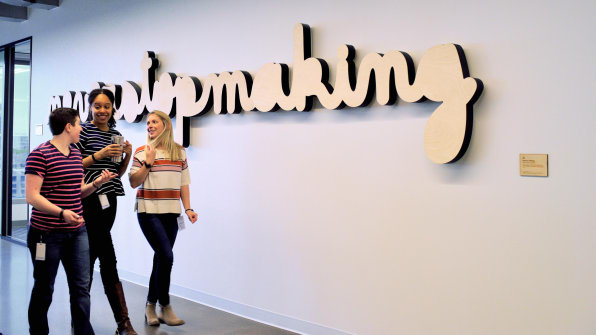From IBM’s Remote Work Reversal To How Facebook Hires: May’;s Top Leadership Stories
This month, Facebook’s head of people explained what the company is looking for in new hires, why IBM’s curtailment of remote work might be a mistake, and the unspoken rules that new grads need to know before entering the workforce.
These are the stories you loved in Leadership for the month of May:
1. I’m Facebook’s Head Of People–Here’s What We’re Hiring For Right Now (And Why)
In 2016, LinkedIn put the tech giant at the top of its ranking of U.S. employers for attracting and retaining talent. What’s Facebook’s special formula? This month, Lori Goler shared what the tech giant is looking for in new recruits, from interns to senior management. One of her tips for interviewees: Talk less about your typical workday and more about your absolute best day at the office.
2. IBM’s Remote Work Reversal Is A Losing Battle Against The New Normal
IBM recently extended an ultimatum to its remote workers: Come back to the office or go elsewhere. The company’s stated rationale was improving collaboration and innovation, but some saw the move as a cost-cutting measure. Comparing it to Yahoo’s decision to end remote work back in 2013, Upwork CEO Stephane Kasriel argues that it’s a bad move for IBM, likely to send its top talent to competitors while stripping away an important incentive for modern job seekers.
3. New Graduates: These Are The Unspoken Rules Of The Workplace No One Tells You
The transition from college to the workplace can be confusing. Gone are the days of advance notice about assignments, due dates that don’t tend to change, and regular feedback. Suddenly, you’re expected to pick up things that nobody taught you, and you might not have any idea whether that last assignment was a disaster or a masterpiece. Welcome to the real world, college grads! Here are some common norms of the workplace that no one’s probably going to clue you in on.
4. This Is The Part Of Your Resume That Recruiters Look At First
There’s no easy shortcut—resumes need to be perfect. But there’s one part of your resume where you really need to put a lot of attention: the top. This may sound obvious, but before you roll your eyes, consider how much the first third of your resume is taken up with blank space and contact info. After all, if you don’t give recruiters a reason to scroll down within 10 seconds, you might as well wave that job goodbye.
5. Do These 5 Things Right Now To Still Be Employable In A Decade
Don’t just think about your employability when you’re actively job searching. Otherwise, by the time you’re ready to jump ship, your skills might be outdated. You can’t predict the future with 100% accuracy, but you can still take some steps right now to keep you competitive a decade from now. You just have to be willing to stretch yourself constantly and remember to schedule regular career check-ins.
6. This Is What Makes A Vacation Restorative
There are a few things you can do while on vacation to return to work feeling recharged. But just as important is what you don’t do—like thinking about that work email, or even getting into situations (like driving in heavy traffic) that can cause a sour mood you’ll risk bringing back into the office.
7. Why You Need To Hire Job Candidates With These Three “Weaknesses”
When you’re hiring a new employee, all advice and logic points to focusing on their strengths. After all, what good would it do to hire someone for their shortcomings? But psychologist Tomas Chamorro-Premuzic points out that as human beings, we’re all flawed in some ways. That’s why, in his view, it’s important to make sure a candidate’s weaknesses don’t cause more trouble for your company than their strengths can help it.
8. Five Skills You’ll Need To Lead The Company Of The Future
The old “command and control” model is a diminishing norm of the corporate world. These days, products and services disappear overnight, and new ones emerge out of nowhere. That means management experience is often no longer enough. Leaders have to excel in constantly changing environments—and even thrive amid chaos when necessary. This month we learned what other skills tomorrow’s leaders will need most.
9. Why James Comey’s Obsessive Note-Taking Is A Smart Strategy For Surviving Difficult Bosses
Former FBI director James Comey kept detailed notes of his conversations with President Trump. While this is standard practice given his line of work, it’s a good strategy any time you’re dealing with a difficult boss. Not only can it help you earn buy-in from your boss and teammates, it also gives you something to refer to if you ever get confused over the details—or for that matter, disagree about them.
10. How To Trick The Robots And Get Your Resume In Front Of Recruiters
As much as you might hate it, many companies use applicant tracking systems (ATS) to filter job applicants. One recruiter, who shares the same hatred of ATSs as most job seekers do, offered some insider tips on what it really takes to get past the robots and still sound impressive.
This month’s top stories explore Facebook’s hiring priorities and the controversy around IBM’s decision to curb remote work.
This month, Facebook’s head of people explained what the company is looking for in new hires, why IBM’s curtailment of remote work might be a mistake, and the unspoken rules that new grads need to know before entering the workforce.
Fast Company , Read Full Story
(70)
























